Abstract
A computer linked Doppler system was used to make continuous measurements of cerebral blood flow velocity (CBFV) from the middle cerebral artery, mean arterial blood pressure (MAP) from the umbilical artery, and heart rate before, during, and for 20 minutes after the endotracheal administration of 200 mg/kg of porcine surfactant in 10 preterm infants with respiratory distress syndrome. Within two minutes of surfactant administration, there was a median fall of 6 mm Hg (15%) fall in MAP and 36% in CBFV. There was a change in the Doppler spectra with almost complete loss of diastolic velocities. A rapid reduction in pulmonary vascular resistance with consequent left to right ductal shunting is one possible cause. These acute changes in MAP and CBFV after bolus surfactant administration may increase the risk of intraventricular haemorrhage.
Full text
PDF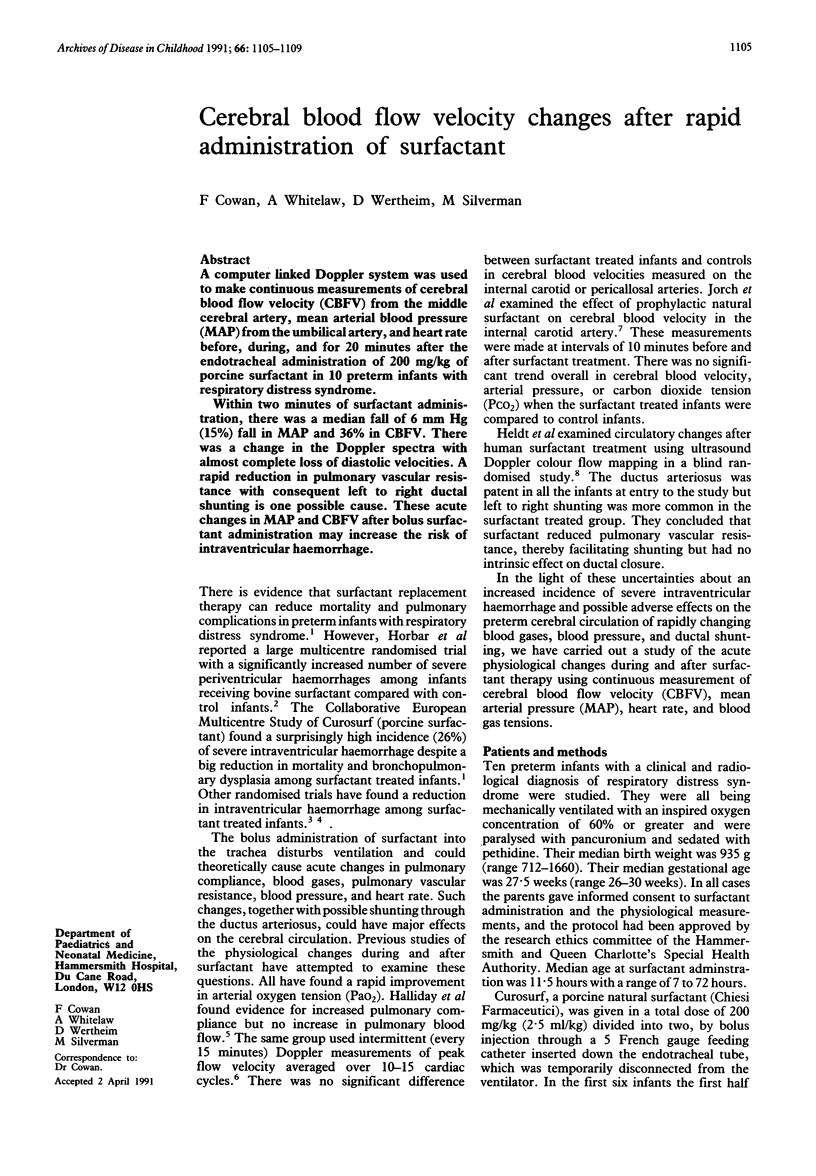
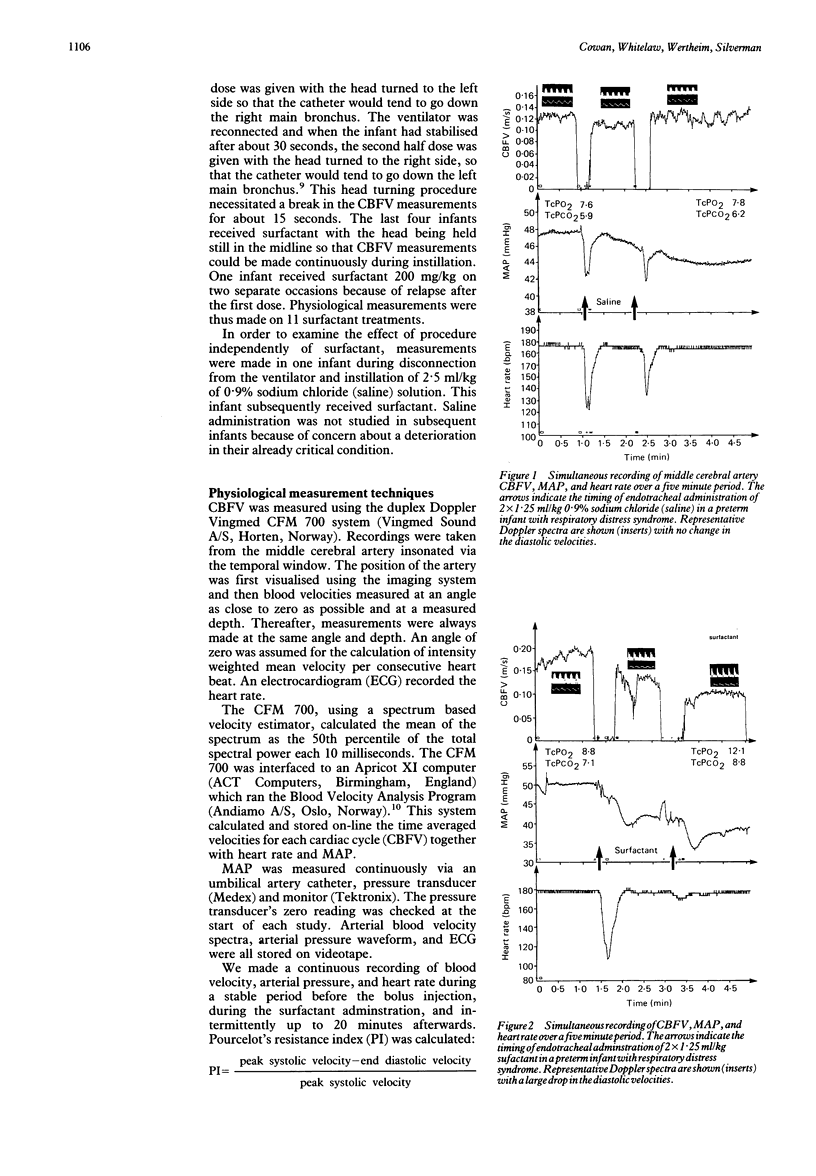
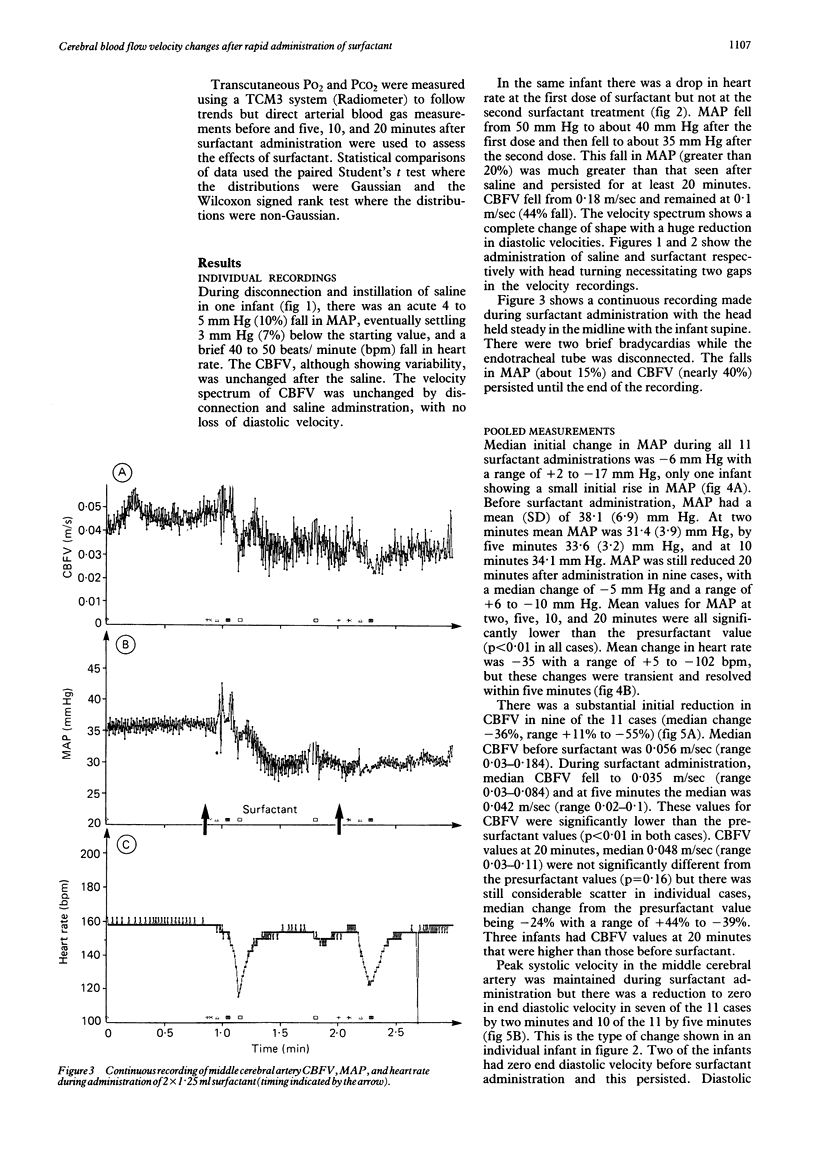
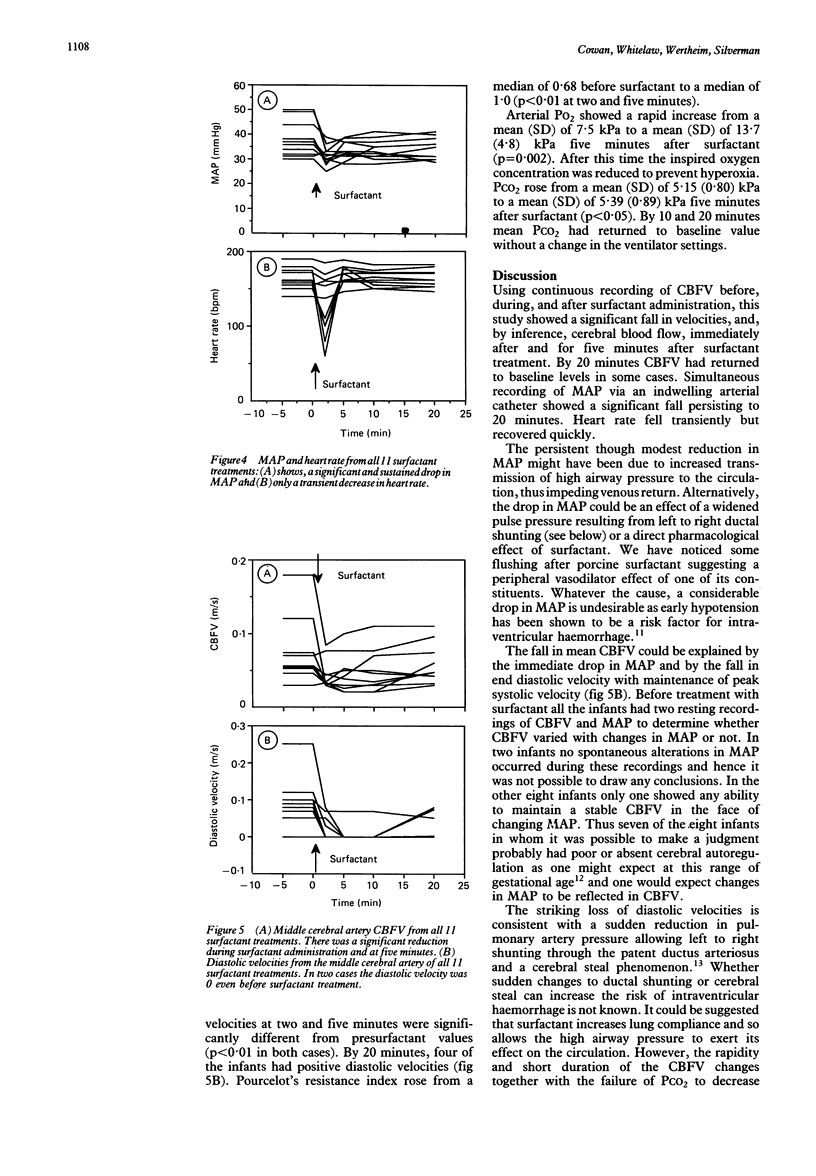
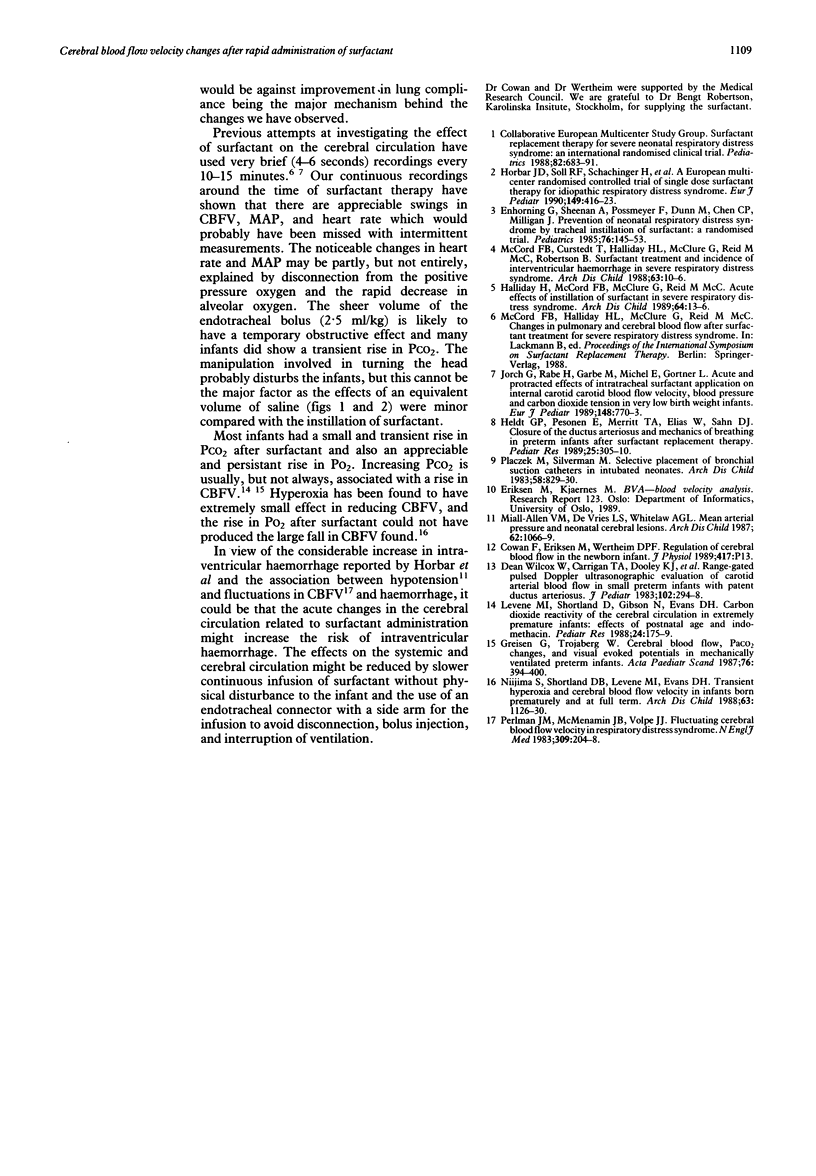
Selected References
These references are in PubMed. This may not be the complete list of references from this article.
- Enhorning G., Shennan A., Possmayer F., Dunn M., Chen C. P., Milligan J. Prevention of neonatal respiratory distress syndrome by tracheal instillation of surfactant: a randomized clinical trial. Pediatrics. 1985 Aug;76(2):145–153. [PubMed] [Google Scholar]
- Greisen G., Trojaborg W. Cerebral blood flow, PaCO2 changes, and visual evoked potentials in mechanically ventilated, preterm infants. Acta Paediatr Scand. 1987 May;76(3):394–400. doi: 10.1111/j.1651-2227.1987.tb10488.x. [DOI] [PubMed] [Google Scholar]
- Halliday H. L., McCord F. B., McClure B. G., Reid M. M. Acute effects of instillation of surfactant in severe respiratory distress syndrome. Arch Dis Child. 1989 Jan;64(1 Spec No):13–16. doi: 10.1136/adc.64.1_spec_no.13. [DOI] [PMC free article] [PubMed] [Google Scholar]
- Heldt G. P., Pesonen E., Merritt T. A., Elias W., Sahn D. J. Closure of the ductus arteriosus and mechanics of breathing in preterm infants after surfactant replacement therapy. Pediatr Res. 1989 Mar;25(3):305–310. doi: 10.1203/00006450-198903000-00020. [DOI] [PubMed] [Google Scholar]
- Horbar J. D., Soll R. F., Schachinger H., Kewitz G., Versmold H. T., Lindner W., Duc G., Mieth D., Linderkamp O., Zilow E. P. A European multicenter randomized controlled trial of single dose surfactant therapy for idiopathic respiratory distress syndrome. Eur J Pediatr. 1990 Mar;149(6):416–423. doi: 10.1007/BF02009663. [DOI] [PubMed] [Google Scholar]
- Jorch G., Rabe H., Garbe M., Michel E., Gortner L. Acute and protracted effects of intratracheal surfactant application on internal carotid blood flow velocity, blood pressure and carbondioxide tension in very low birth weight infants. Eur J Pediatr. 1989 Aug;148(8):770–773. doi: 10.1007/BF00443108. [DOI] [PubMed] [Google Scholar]
- Levene M. I., Shortland D., Gibson N., Evans D. H. Carbon dioxide reactivity of the cerebral circulation in extremely premature infants: effects of postnatal age and indomethacin. Pediatr Res. 1988 Aug;24(2):175–179. doi: 10.1203/00006450-198808000-00007. [DOI] [PubMed] [Google Scholar]
- Maaswinkel-Mooy P. D., Poorthuis B. J., van Gelderen H. H., van de Kamp J. J. Dicarboxylicaciduria and secondary carnitine deficiency in glycogenosis type IV. Arch Dis Child. 1987 Oct;62(10):1066–1067. doi: 10.1136/adc.62.10.1066. [DOI] [PMC free article] [PubMed] [Google Scholar]
- McCord F. B., Curstedt T., Halliday H. L., McClure G., Reid M. M., Robertson B. Surfactant treatment and incidence of intraventricular haemorrhage in severe respiratory distress syndrome. Arch Dis Child. 1988 Jan;63(1):10–16. doi: 10.1136/adc.63.1.10. [DOI] [PMC free article] [PubMed] [Google Scholar]
- Niijima S., Shortland D. B., Levene M. I., Evans D. H. Transient hyperoxia and cerebral blood flow velocity in infants born prematurely and at full term. Arch Dis Child. 1988 Oct;63(10 Spec No):1126–1130. doi: 10.1136/adc.63.10_spec_no.1126. [DOI] [PMC free article] [PubMed] [Google Scholar]
- Perlman J. M., McMenamin J. B., Volpe J. J. Fluctuating cerebral blood-flow velocity in respiratory-distress syndrome. Relation to the development of intraventricular hemorrhage. N Engl J Med. 1983 Jul 28;309(4):204–209. doi: 10.1056/NEJM198307283090402. [DOI] [PubMed] [Google Scholar]
- Placzek M., Silverman M. Selective placement of bronchial suction catheters in intubated neonates. Arch Dis Child. 1983 Oct;58(10):829–831. doi: 10.1136/adc.58.10.829. [DOI] [PMC free article] [PubMed] [Google Scholar]
- Wilcox W. D., Carrigan T. A., Dooley K. J., Giddens D. P., Dykes F. D., Lazzara A., Ray J. L., Ahmann P. A. Range-gated pulsed Doppler ultrasonographic evaluation of carotid arterial blood flow in small preterm infants with patent ductus arteriosus. J Pediatr. 1983 Feb;102(2):294–298. doi: 10.1016/s0022-3476(83)80546-0. [DOI] [PubMed] [Google Scholar]


